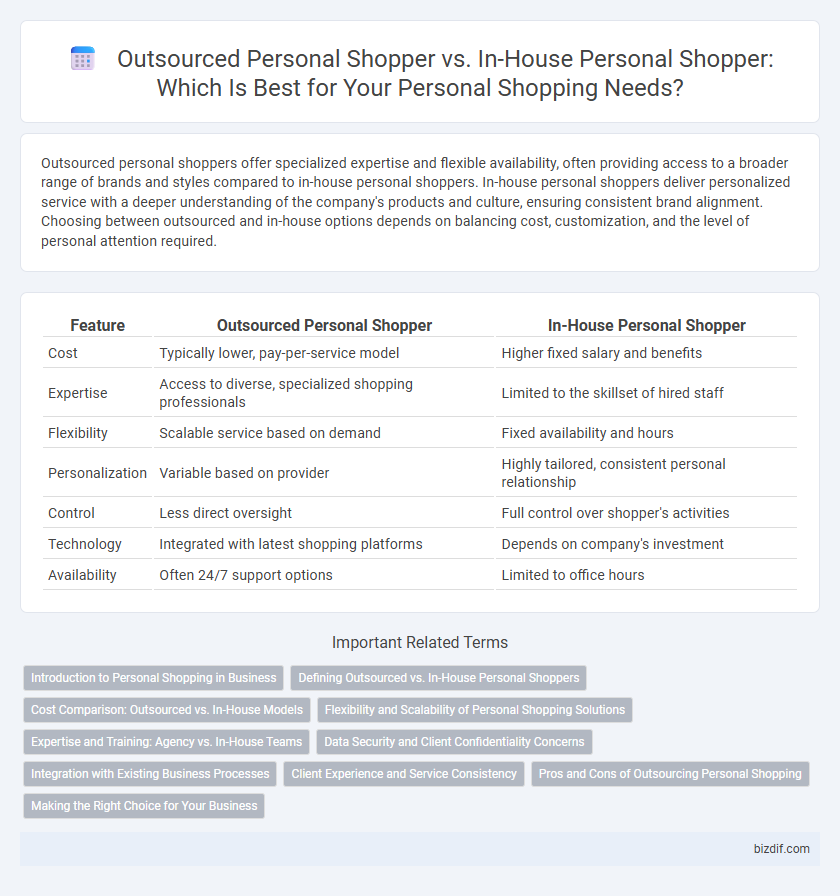Outsourced personal shoppers offer specialized expertise and flexible availability, often providing access to a broader range of brands and styles compared to in-house personal shoppers. In-house personal shoppers deliver personalized service with a deeper understanding of the company's products and culture, ensuring consistent brand alignment. Choosing between outsourced and in-house options depends on balancing cost, customization, and the level of personal attention required.
Table of Comparison
| Feature | Outsourced Personal Shopper | In-House Personal Shopper |
|---|---|---|
| Cost | Typically lower, pay-per-service model | Higher fixed salary and benefits |
| Expertise | Access to diverse, specialized shopping professionals | Limited to the skillset of hired staff |
| Flexibility | Scalable service based on demand | Fixed availability and hours |
| Personalization | Variable based on provider | Highly tailored, consistent personal relationship |
| Control | Less direct oversight | Full control over shopper's activities |
| Technology | Integrated with latest shopping platforms | Depends on company's investment |
| Availability | Often 24/7 support options | Limited to office hours |
Introduction to Personal Shopping in Business
Personal shopping in business enhances customer experience by providing tailored product recommendations and personalized service. Outsourced personal shoppers offer specialized expertise and scalability, enabling businesses to adapt quickly to market demands without increasing internal staff. In-house personal shoppers maintain direct brand alignment and consistent customer engagement, ensuring a deep understanding of company values and customer preferences.
Defining Outsourced vs. In-House Personal Shoppers
Outsourced personal shoppers operate as external consultants hired on an as-needed basis, offering flexibility and access to diverse expertise without the overhead of full-time employees. In-house personal shoppers are dedicated staff members integrated within the company, providing consistent brand-aligned service and personalized client relationships through direct interaction. Choosing between outsourced and in-house options depends on factors like cost efficiency, service customization, and the frequency of client engagements.
Cost Comparison: Outsourced vs. In-House Models
Outsourced personal shoppers typically offer a flexible cost structure, often based on a subscription or per-service fee, which can reduce overhead expenses for businesses compared to hiring full-time in-house staff. In-house personal shoppers involve fixed salaries, benefits, and training costs, leading to higher upfront and ongoing investments. Businesses must evaluate the trade-off between the scalability and control provided by outsourced models versus the potential for personalized brand alignment and dedicated service from in-house teams.
Flexibility and Scalability of Personal Shopping Solutions
Outsourced personal shoppers offer unmatched flexibility by providing access to a diverse pool of experts tailored to varying client needs and budgets, allowing for easy adjustment of service levels. In-house personal shoppers deliver consistent, brand-aligned experiences but often lack the scalability required during peak demand or seasonal fluctuations. Leveraging outsourced personal shopping solutions enables businesses to scale operations efficiently without the overhead of recruiting and training, optimizing resource allocation while maintaining personalized service quality.
Expertise and Training: Agency vs. In-House Teams
Outsourced personal shoppers often bring a diverse range of expertise gained from working with multiple clients and brands, supported by specialized agency training programs focused on current trends and industry standards. In-house personal shoppers, however, typically develop deeper brand-specific knowledge and personalized client understanding through ongoing internal training and direct collaboration with store teams. Both models prioritize skill development, but agencies emphasize broader market experience, while in-house teams concentrate on tailored brand expertise.
Data Security and Client Confidentiality Concerns
Outsourced personal shoppers often rely on third-party platforms that may present increased risks to data security and client confidentiality due to less controlled environments. In-house personal shoppers operate within a company's secure network, ensuring tighter protection of sensitive client information and adherence to company privacy policies. Choosing in-house services reduces the vulnerability of personal data breaches, maintaining higher standards of confidentiality and trust.
Integration with Existing Business Processes
Outsourced personal shoppers often face challenges integrating seamlessly with existing business processes due to differing systems and communication protocols. In-house personal shoppers provide better alignment with company workflows, enabling more efficient inventory management and personalized customer experiences. This tighter integration enhances real-time data sharing, leading to improved sales performance and customer satisfaction.
Client Experience and Service Consistency
Outsourced personal shoppers offer diverse expertise and flexible service hours, enhancing client experience through personalized styling across multiple brands. In-house personal shoppers ensure consistent service quality by maintaining brand alignment and direct communication, fostering stronger client relationships. Both approaches impact service consistency and client satisfaction, depending on the retailer's focus on customization versus operational control.
Pros and Cons of Outsourcing Personal Shopping
Outsourcing personal shopping offers access to specialized expertise and a broader network of retailers, often resulting in more diverse and customized selections. Cost efficiency can be a significant advantage, as outsourced shoppers reduce overhead expenses like salaries and benefits associated with in-house staff. However, challenges include less control over the shopping process and potential misalignment with brand values or customer preferences.
Making the Right Choice for Your Business
Choosing between an outsourced personal shopper and an in-house personal shopper depends on your business's budget, control needs, and scalability goals. Outsourced personal shoppers offer cost-effective flexibility and access to diverse expertise, optimizing operational efficiency without long-term commitments. In-house personal shoppers provide personalized brand alignment and consistent service quality, fostering strong customer relationships vital for luxury retail and bespoke shopping experiences.
Outsourced Personal Shopper vs In-House Personal Shopper Infographic

 bizdif.com
bizdif.com